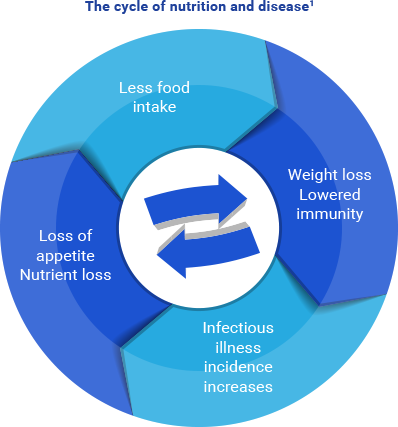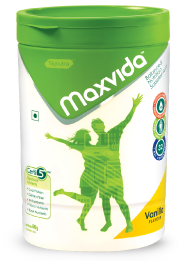
Infections and nutrition
Poor nutritional status and low immunity increases the chances of getting common infections. On suffering from an infection, a person loses appetite and eats less food.1
Lesser food intake can lower immunity which can, in turn, increase chances of re-infections.1

How do infections affect nutrition?
Infections affect the nutritional status of the body adversely. Fever increases the energy demand of the body. Also, during an infection, fewer nutrients are absorbed from food. In infections, the energy demands of the body remain high for a long time (several days to several months). Also, there is an increase in breakdown and excretion of proteins. The symptoms of infections such as sweating, nausea, vomiting, and diarrhoea can themselves lead to nutrient loss.2
All infections, including the mild ones, will decrease nutrient intake and increase nutrient losses.3 A nutritionally rich diet can help the patient recover faster and strengthen the defense mechanisms of the body.
Nutritional requirement in infections

Carbohydrates:
The increased metabolic rate of the body during fever increases the calorie requirements. Also, due to fever, the patient’s appetite is poor and digestion may be hampered, hence consuming more amounts of carbohydrates may be advisable. If a person suffers from high fever for a long time, the energy intake needs increase by almost 50%.2
Fruits juices and liquids with added sugar can be given to the patient as it is easily used up by the body.2 Easily digestible carbohydrates like rice, simple porridges, fruit juices, and nutritional supplements are recommended.

Proteins:
During recovery from most infections, consuming about 20-25% more protein is recommended. A high protein diet supplying about 1.25-1.5g protein per kg of body weight per day should be given to such patients. The protein requirement increases to an even larger extent during serious infections.
Good quality protein can be obtained from fish, poultry, lean red meat, eggs, dairy products, nuts, dried beans, peas, lentils, and soy. Protein supplements may also help meet the increased demand of proteins by the body.2,4,5

Vitamins:
Vitamin requirements are increased in infections. In conditions like tuberculosis, vitamins A (retinol) and C (ascorbic acid) are advised for faster recovery and quicker tissue regeneration. B-complex vitamins, especially vitamin B9 (folic acid), should be consumed in larger amounts. Eating a wide variety of fruits and vegetables can meet the increased vitamin demands.2

Minerals:
During infections, two minerals, sodium and potassium are lost in large amounts and need to be replaced. Sodium can be obtained in the form of salt in soups, curries, or broths. Potassium is present in fruits juices and milk.2
|
Tips for managing nutrition during and after infections:
|
How can a nutritional supplement help?
In certain infections, particularly gastrointestinal infections, a person may be unable to eat and digest solid food. Hence, a liquid diet with all the essential nutrients can provide faster recovery and may protect from further infections.

Our balanced nutritional supplement, MaxvidaTM, contains all essential nutrients such as carbohydrates, high quality easily digestible protein, and vitamins and minerals that help in improving the recovery process. It can also be used for tube-feeding in hospitalized patients. |

We suggest having 1 serving of MaxvidaTM, 2 levelled scoops prepared with water, twice a day, along with an easily digestible, nutritionally rich diet to help cope with infections.
References